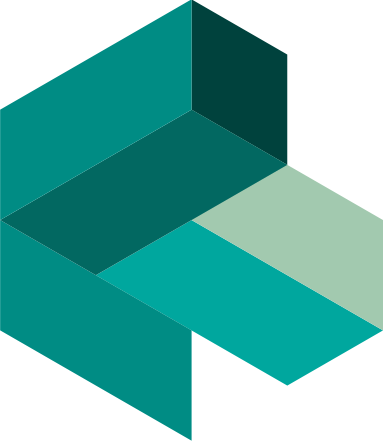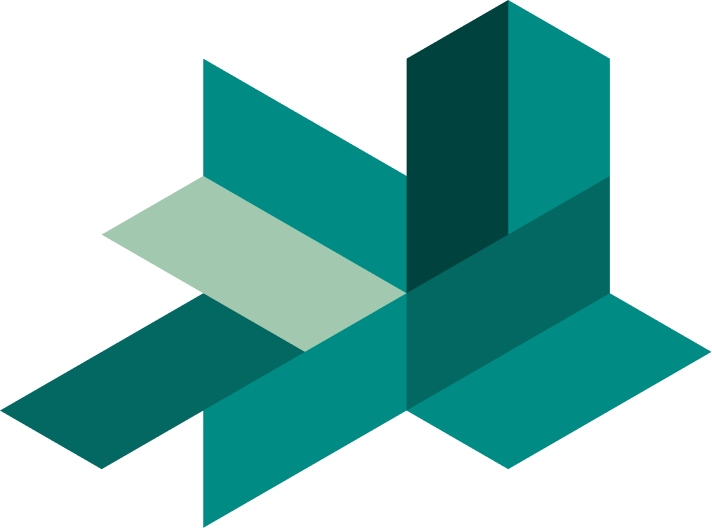Support the MAC – Give Today

Click through the tabs to see our achieve of past projects!
Alongside our State of Belfast exhibition, we’re hosted a series of talks, workshops, screenings and creative actions that opened up urgent conversations about Belfast today, and the future we want to build.

The Rent Strike with CATU Belfast | Wed 23 July | 6.30pm | Age: 16+
CATU Belfast (Community Action Tenants’ Union) will host a screening of THE RENT STRIKE, a documentary film which celebrates the 1970-1973 Irish rent strike action.

Our Housing Crisis: What is to be done? | Fri 25 July | 1pm
Participation and the Practice of Rights (PPR) will lead a conversation exploring the history of the housing struggle in Northern Ireland, from its roots to today's solutions.
This talk and public conversation will be set in The State of Belfast exhibition where we can collectively explore the history of the current housing crisis through timelines and artifacts. We will ask who is to blame, who is not to blame, what do we do? What can we do?

Signs in Solidarity: A Signwriting & Advocacy Workshop Facilitated by Laura Nelson | Fri 1 August | 11am-4pm | Age: 16+
Join visual artist and signwriter Laura Nelson for a hands-on workshop where creativity meets activism.
Signs in Solidarity invites participants to design and create powerful placards, banners, and signs advocating for affordable social housing. This welcoming and supportive workshop offers a space to connect with others and raise your voice through visual expression. You'll learn sign-making techniques, drawing inspiration from the rich history of protest signage and its makers.

The Sonic Railroad: Tracing Solidarity Through Music | Thu 7 August | 6.30pm-8pm
Noah Totten, a musician who performs a fusion of trad and jazz music as redbrd, will present a seminar that uncovers the hidden roots of both ancient and contemporary music, and how they reveal evidence of trans-continental solidarity and organisation from the years BC to the present day.

Saving Cathedral Quarter | Thu 14 August | 5pm-6.30pm | Age: 18+
Join us for a walking tour of Cathedral Quarter where we will be discussing the area’s recent decline and future potential.
Drawing on our architectural research and activism with the 'SaveCQ' campaign, we will be encouraging conversations on urban heritage, mixed-use development, housing in the city centre, gentrification and neoliberal urbanism.

Writing Home: A Poetry Workshop on Housing Rights Led by Damian Gorman | Sat 16 August | 11am-4pm | Age 18+
Join award-winning poet and writer Damian Gorman for a powerful one-day workshop exploring housing inequality through poetry.
This workshop is for anyone who wants to give voice to their experiences, frustrations, and hopes around housing and home. Through guided writing sessions and group discussion, you'll learn how to shape your thoughts and stories into poetic form—whether you're a seasoned writer or trying poetry for the first time.

Homes for Belfast: A Creative Workshop for Kids Imagining a Better City Through Art and Play | Sat 16 August | 11am-1pm | Age: 7-11 yrs
In Homes for Belfast, children are invited to dream big and build bold! This hands-on workshop encourages young minds to design and create homes using recycled materials, while learning about the city around them.

Hearsay at Point Zero: Screening and walk with artist Marta Dyczkowska | Sat 30 August | 12pm-2pm | Age: 18+
Join Marta Dyczkowska for a screening of her film Hearsay at Point Zero exhibited in the MAC Sunken Gallery.
Following the film, Marta will provide a brief introduction and guide you through the streets of Belfast and film locations, aiming to gather collective memories of the area through oral and creative testimonies. The memory mapping of North Street will commence at Point Zero (Assembly Rooms, also known as Four Corners) and will extend to Carrick Hill, covering distance of 0.6 miles.
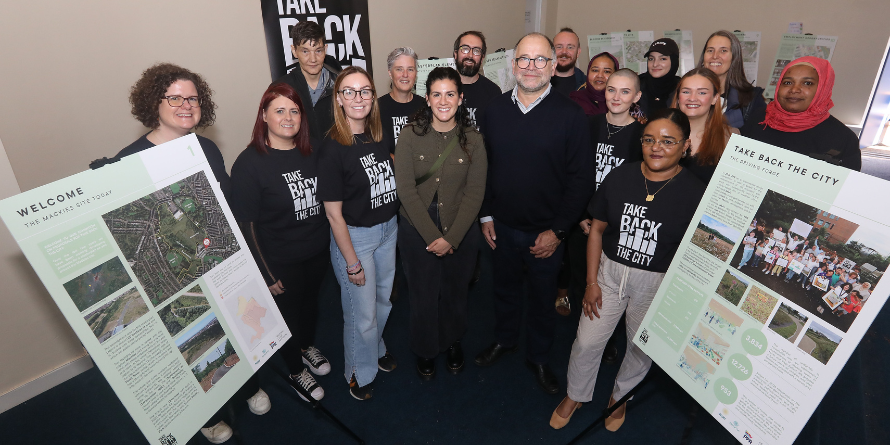
A new vision for housing: In conversation with Matthew Lloyd and PPR's Take Back the City Activists | 5 September | 6:30pm - 8pm
Participation and the Practice of Rights (PPR) Take Back the City (TBTC) activists are joined by Matthew Lloyd, award-winning architect of TBTC’s Mackie’s Masterplan to take a closer look at how this 25 acre brownfield site in Belfast of public land can be used to address the crisis in social housing supply, in a way that respects communities, climate and health.
Matthew Lloyd Architects are an award-winning RIBA Chartered Practice based in Shoreditch, East London, who have won recognition for sensitive, innovative, contextual architecture in urban settings. Together the panel will discuss land justice, rights based approaches and how the participation of homeless families in planning and design processes ensures that future housing developments address current societal issues as well as protect and foster sustainable living for our future generations.

Thinking of Home through Geopolitics, Memory and Justice | Tue 9 September | 3pm-5pm | Age: 16+
What does “home” really mean in a world shaped by inequality, displacement, and struggle?
In this lecture-performance, Dr. Azadeh Sobout invites us to rethink the idea of home—not just as a place to live, but as a site of resistance and a lens through which we can confront systems of power, colonialism, and injustice. Challenging the mainstream push to simply “build more housing,” Dr. Sobout explores deeper questions: What if housing itself could help us reimagine care, community, and belonging?

Reimagining Home Together: Tackling NI's Housing Crisis | Sat 13 September | 2pm-3.30pm
Join us at the MAC on Saturday 13 September for a workshop to explore student proposals for the Mackie’s site, developed by the StreetSpace studio at Queen’s University.
This event invites discussion on a spatial plan tackling Northern Ireland’s housing crisis through a design-led, human-centred approach. In partnership with PPR's campaign Take Back the City and international research project Change Stories, this project reimagines public land for inclusive housing with all the services and amenities needed for a good quality of life.
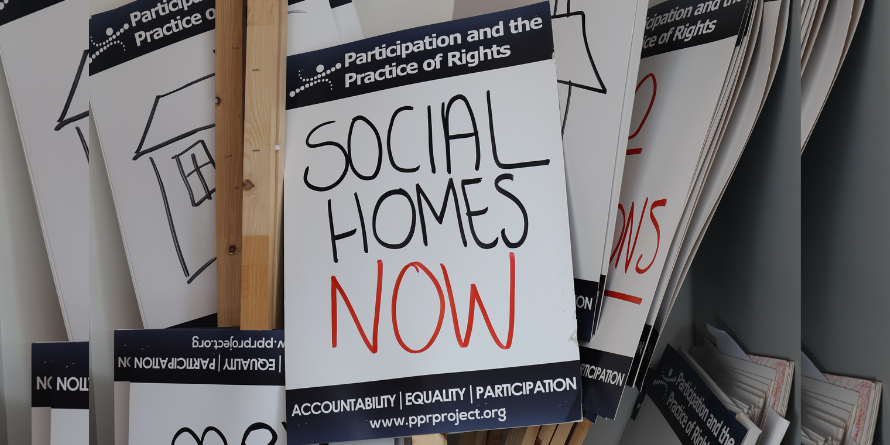
From Grenfell to Belfast: Race, Poverty, and the Politics of Housing | 19 September | 6.30pm - 8pm
The Grenfell Tower fire exposed not only a devastating loss of life but also the deep structural inequalities of race, poverty, and class that shape who gets safe housing- and who doesn’t.
This event connects that tragedy to the housing crisis in Belfast, unpacking how systemic neglect, economic injustice, and racial inequality intersect in both contexts. Through critical analysis and lived experiences, we will explore what these parallels reveal about power, accountability, and the urgent need for housing justice.
This event will include an introduction to The State of Belfast, an exhibition exploring housing inequality; a film screening of Seeking Home, a short film about a homeless refugee family, and how precarious their life is; light food by the Kind Economy Chefs; and conversations with Grenfell survivors, anti-racism and housing activists, refugees and film-makers.
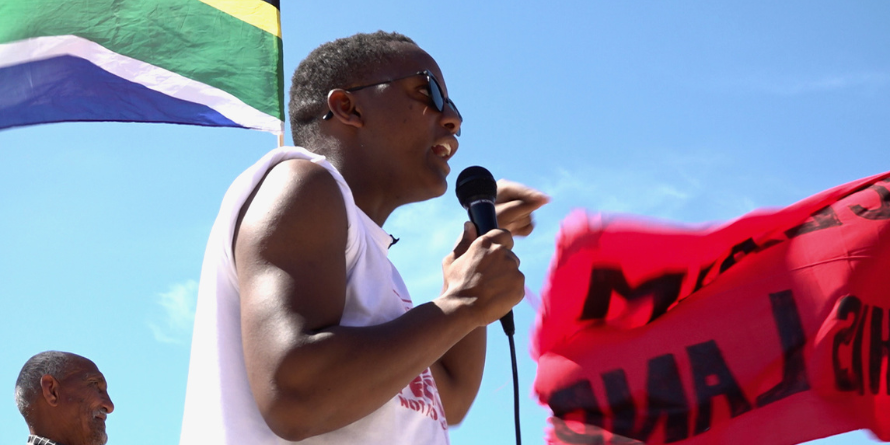
Mother City | 20 September | 18+ | 2pm - 4.30pm
Join us for a special screening of Mother City followed by a conversation with film-maker Pearlie Joubert, PPR housing activists and advocates.
Mother City is a simultaneously heart-breaking and inspiring story about the profoundly personal and political struggle for land and housing in Cape Town, South Africa. Following the story of the Reclaim the City movement, supported by activists and lawyers, the film reveals the complexities and devastation of spatial inequality and the commodification of land and housing in the city.

Mini Architects – Let’s Design a City | Sat 20 September | 11am-1pm | Age: 7-11yrs
In this imaginative workshop, children become Mini Architects, using drawing and collage to dream up a city where everyone has a home.
With the help of local artists, kids will explore what makes a home—and a city—welcoming and fair for all. They’ll create vibrant, mixed-media artworks that show their own designs for houses, neighbourhoods, and community spaces that leave no one behind.
Programmed as part of The State of Belfast exhibition. The State of Belfast uses Grenfell by Steve McQueen as a stepping off point to address the inherent injustices and inequality as well as issues of race and poverty which are inextricably linked to the Grenfell tragedy. The State of Belfast explores how these same conditions exist in Belfast and how we might collectively address them.
This national tour of Grenfell is being coordinated by Tate in collaboration with the partner venues and is made possible thanks to support using public funding by the National Lottery through Arts Council England and from Art Fund. Each presentation will be free to visit and will be accompanied by a public engagement programme of talks, workshops and community events supported by the Grenfell Foundation.
Supported by:

With thanks to our funders:

In 1991, one hundred brave people marched down Royal Avenue in Belfast, waving homemade banners and placards that proudly declared: "We're here, we're queer, and we ain't going anywhere!" This marked the first-ever Belfast Pride, a historic moment for the city’s LGBTQIA+ community.
Since then the LGBTQIA+ community have faced challenges, prejudice, and discrimination amidst the ever-evolving Northern Ireland and global landscape. At the same time celebrating numerous steps forward for equality. As we face an uncertain future, including new laws threatening our rights, the attempted erasure of the Trans community and increased intolerance, we reflect: how has 'pride' changed over the years to become a celebration of visibility, positivity, and inclusion for everyone?
A Queer Dander looks at the history of pride in Belfast by interviewing a small but representative selection of the community on reflecting on the concept of Belfast Pride within the wider context of Northern Ireland, how it came to be and what role it needs to play in our futures.
Curated by Thomas Wells with support from filmmaker Niamh McCann, and commissioned by Belfast Pride and the MAC, the project includes contributions from Ruth McCarthy, Richard O'Leary, Electra, Shogher Doghramajian, Tina McCombe, and Charlie Beare, with special thanks to The Rainbow Project, Boombox Belfast, editor Shaun Doogan, Rebecca Laverty (National Museums NI), PRONI, and NI Screen Digital Film Archive.
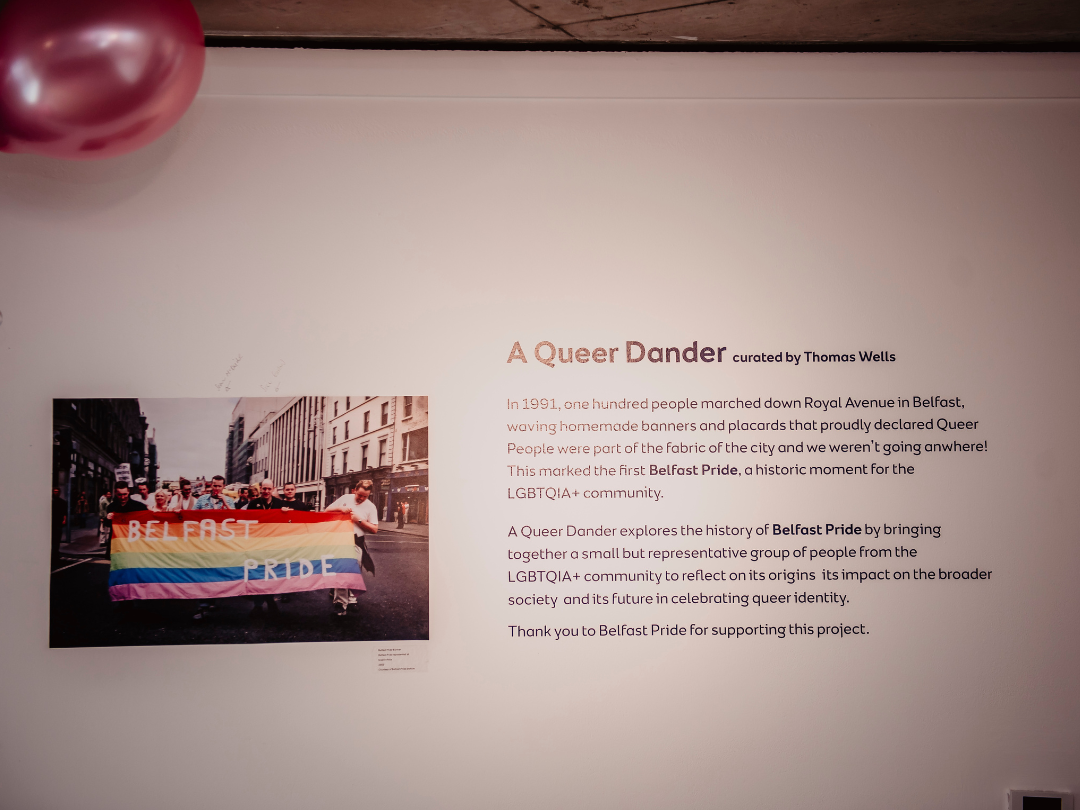
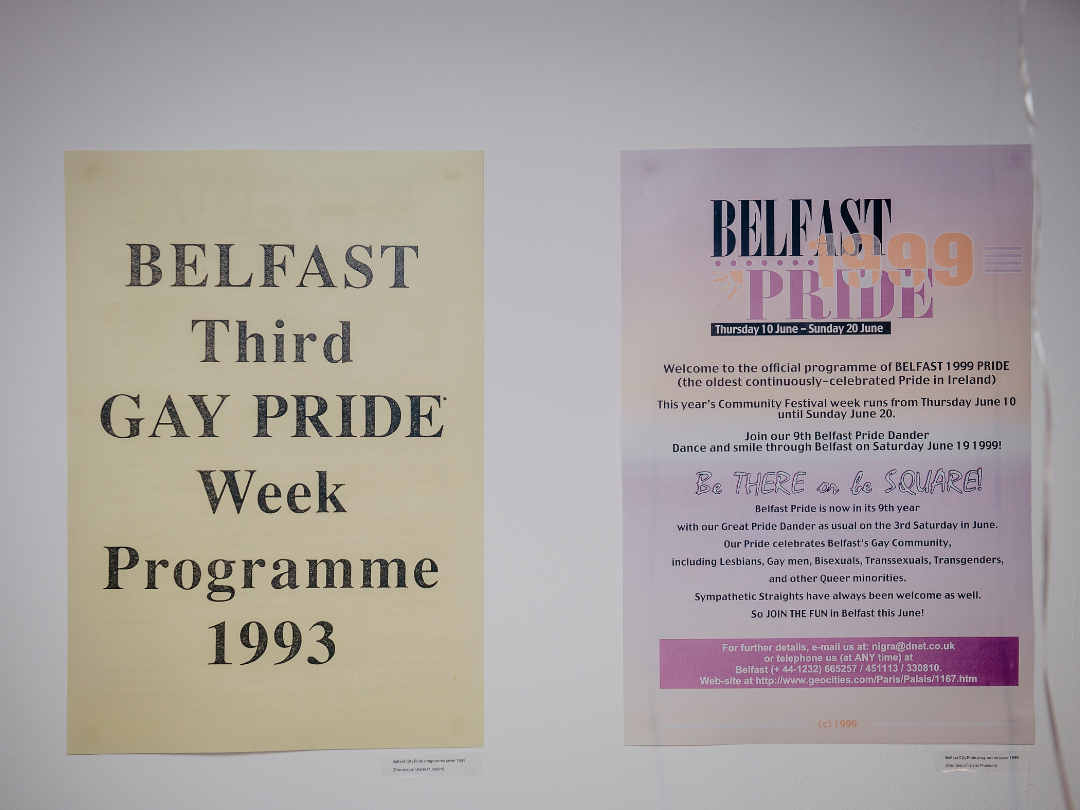
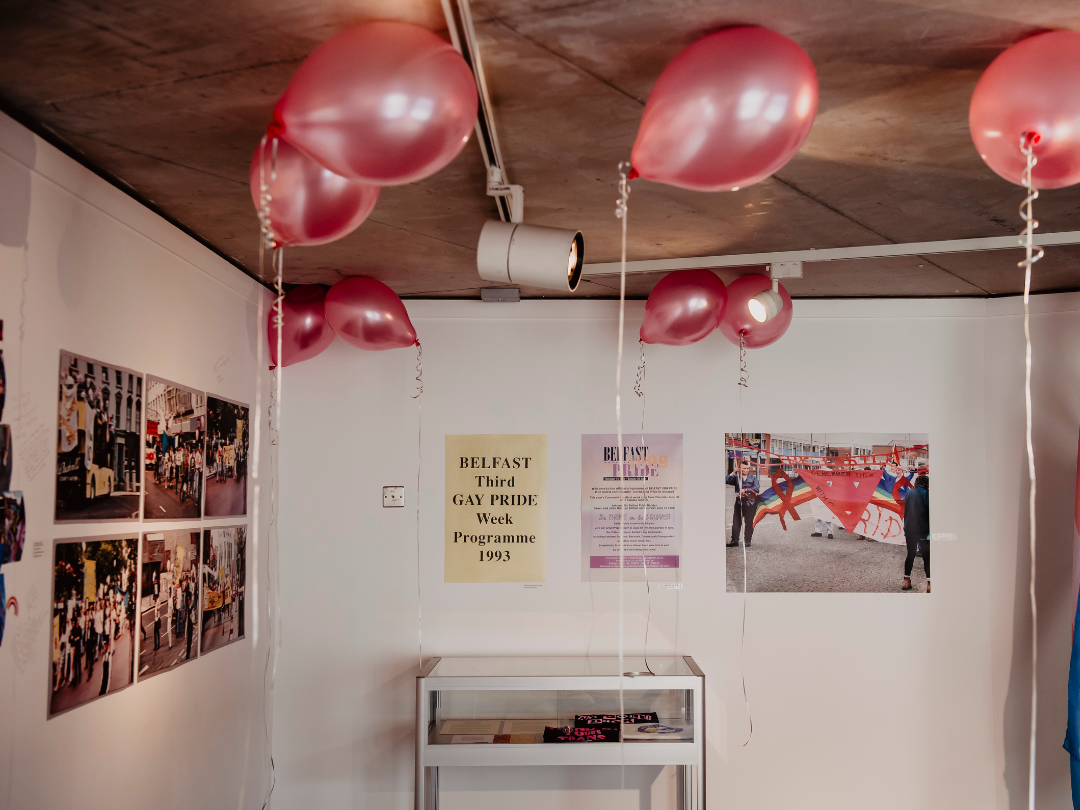


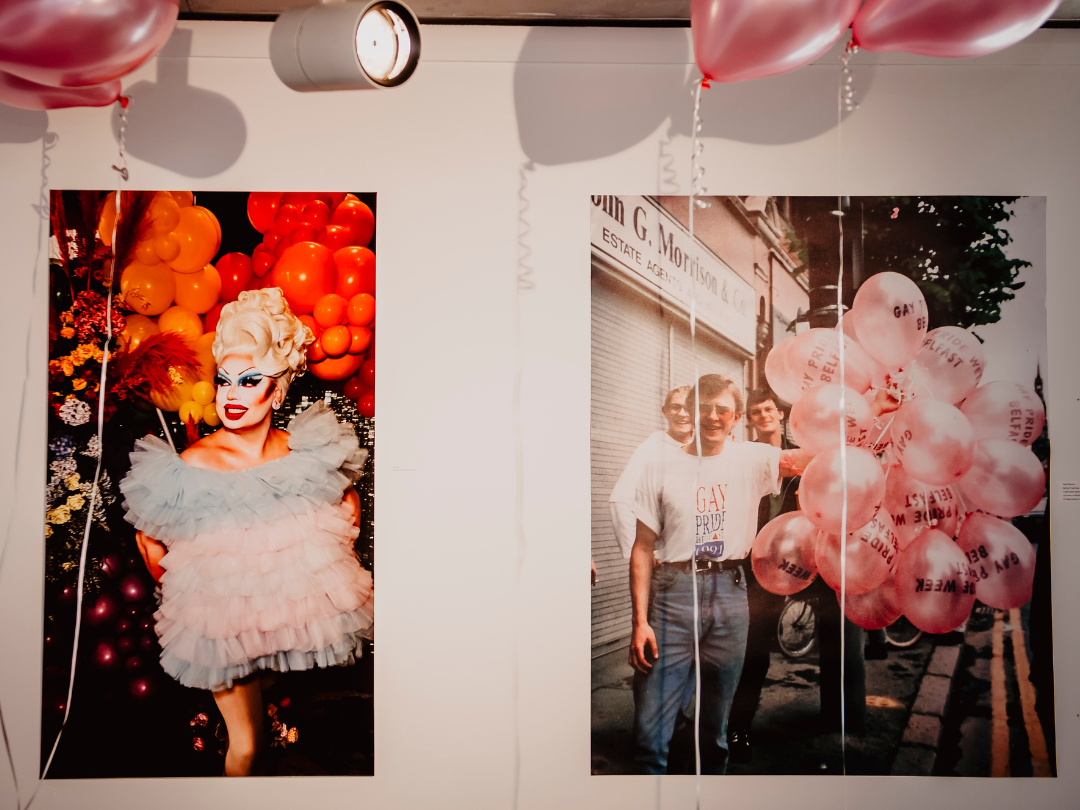
Artist biography
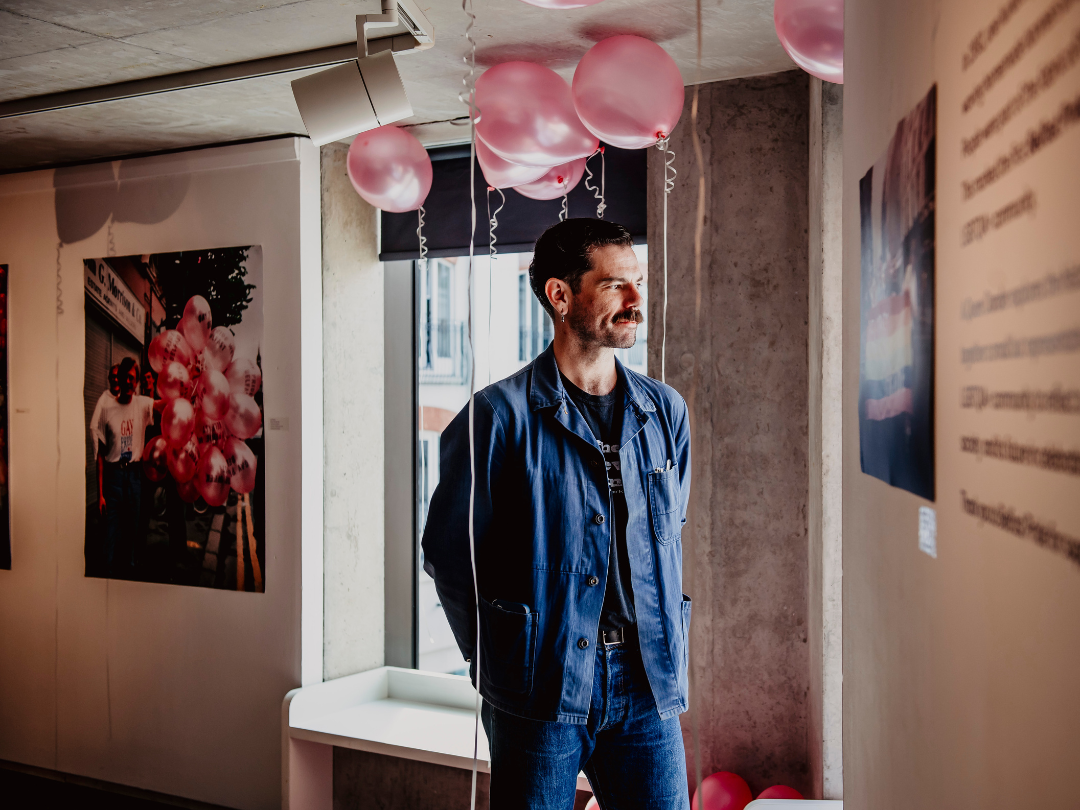
Thomas Wells (he/they) is an artist and curator based in Belfast. Their work centers on socially engaged practice, especially around LGBTQ+ experiences. Originally from Manchester, they’ve been working in Northern Ireland since 2017 and are a member of the Turner Prize-winning Array Collective. Thomas founded the queer arts platform SAM’S EDEN and in 2024 became an artist-in-residence at Platt Hall, Manchester.
For more information visit Thomas Wells' website.
The Shake Community Project
As part of The Shake, an exhibition by artist Khaled Barakeh, we hosted a series of community-focused interventions exploring themes of reconciliation. These included thought-provoking conversations and a powerful commissioned dance piece.
Led by dancers Janie Doherty and Rosie Mullan, the Shake Dance Project brought together 11 women—mental health campaigners and individuals with lived experience of the asylum system. Through movement and collaboration, they created a deeply personal and politically resonant performance, which was showcased at two events addressing reconciliation and activism.
“I am blown away. We smashed it. The piece today was epic. Our journey has been wonderful together, and we formed a special, unique, and beautiful bond. I felt something really powerful in the dance. The audience was so close to the action, and I could feel their presence. Truly powerful and an experience I will never forget.” The Shake Dance Project Participant / PPR Mental Health Activist
Art & Activism: Shaping the Future of Northern Ireland
Inspired by the themes of The Shake, we hosted Exploring Art, Activism, and the Future of Northern Ireland in partnership with Create, Ireland’s national development agency for collaborative arts. This gathering brought together 50 artists, activists, and community members from across the island to discuss pressing local, national, and global issues while fostering meaningful connections and networks.
Exploring Art & Reconciliation: A Conversation
In collaboration with Politics in Action and the Social Change Initiative, we facilitated a dialogue on art, activism, and reconciliation, using The Shake as a starting point to reimagine the future of Northern Ireland. This event explored key themes such as shared education and the legacy of the Good Friday Agreement, with participation from notable figures, including Minister for Northern Ireland Fleur Anderson, ACNI Chair Liam Hanaway, and women’s rights advocate Bronagh Hinds.
“The event was refreshing and brave for an arts organisation.” Human Rights Activist
Through these events, we continue to use art as a catalyst for dialogue, healing, and transformation.
Find out more about the project:
Future Garden
Future Garden by Dumbworld co-created with Participation and the Practice of Rights
Multi-media production company Dumbworld collaborated with Participation and the Practice of Rights, people in the asylum system, mental health activists and people living in housing distress. Future Garden asked how the needs & rights of humans for shelter can coexist with our need to care for the planet we live on.
The former Mackies factory site in West Belfast, where an estimated 2,000 children live in housing stress, is to be developed as a greenway with no additional housing provision. Dumbworld & PPR asked “Why can’t we have both housing & environmental protection?” Future Garden is the story of two gardens. The Mackies factory owner’s 12-acre private botanical garden at Helen’s Bay … and a Future Garden which does not exist yet. It is a speculative project of co-curation imagining a future garden for the Mackie's site in Belfast; the plants that could grow here & the ethics of care that could underpin it.



Sam's Eden by Thomas Wells in collaboration with The Rainbow Project
SAM'S EDEN is a new queer arts publication and research project established in 2018 by artist and curator Thomas Wells. The aim of the project is to support and platform new LGBTQIA+ art,writing and activism with a focus on building queer community and spaces both in the physical and non-physical realm.

SAM'S EDEN two commissioned by the MAC in partnership with The Rainbow Project NI developed a series of workshops with facilitators in a range of creative practices including architecture, performance art and mark making to look at queer visibility in cultural spaces. The content of these workshops has been developed into a publication (available to purchase through the MAC box office) documenting the nine-month project as well featuring a newly commissioned work by artist|educators Sara da Costa and Arjen Ploegar.
Thomas would like to thank all participants of the project, full list are included in the publication. Workshop facilitators included; (dw) Dean Black, Array Collective + Janie Doherty, Charlie Beare, Jane Peaker and Emma Brennan, with special thanks to Hannah and Johnny at High Society and Finn Paul as well as the team behind the scenes at the MAC and The Rainbow Project.

2. SAM'S EDEN two - 'Bent Over Straight Lines' by (dw) Dean Black (image credit Thomas Wells)
4. SAM'S EDEN two - 'Hairstory' Portraits by Charlie Beare.
5. SAM'S EDEN two - 'Sounds + Silence' Janie Doherty and Array Collective. Responses to twin life drawing life drawing classes one with a moving subject, dancer Janie Doherty and another with a still body.
6. SAM'S EDEN two - 'Sounds + Silence' Janie Doherty and Array Collective.

Hope is a Thing - Kerrie Hanna in collaboration with Action Mental Health
Northern Ireland has a mental health crisis. Department of Health statistics show a massive 25% higher overall prevalence of mental health problems in Northern Ireland than England. One-in-six young people have an eating disorder and one-in-ten deliberately self-harm. The Department recognises “the powerful contribution that arts and creativity can make to mental health”.
Participants from Action Mental Health collaborated with visual artist Kerrie Hanna to create illustrations provoking hope, creating community as an act of resistance, and exploring feelings of belonging and issues around living with and managing mental health diagnoses. Participant-led discussions centred on the power of acknowledging there is no magic 'happy ending' in life - there is a daily commitment to showing up, to exploring inner worlds, and to the power of artistic expression to move us forward. Kerrie & participants co-designed two images presented on public billboards throughout Belfast during Mental Health Awareness week in May 2023 for 2 weeks.

Weaving the Present, Shaping the Future by Khaled Barakeh in collaboration with Participation and the Practice of Rights, and Anaka Womens Collective
To shed light on the living conditions faced by individuals in the asylum system in Northern Ireland, the MAC Belfast hosted an exclusive performative dinner and socially engaged artistic intervention titled "Weaving the Present, Shaping the Future" created by artist Khaled Barakeh in collaboration with Participation and the Practice of Rights and the Anaka Women's Collective as part of the MACtiviate project "At The Table". The project featured several artistic elements: a curated dinner, AI image-generated photographic works, a socially engaged workshop that resulted in eleven photographs, and a fashion show.
The event was a unique opportunity to examine and discuss the issues faced by people in the asylum system who seek safety in Northern Ireland and highlight the resilience and skills of artists, creatives, designers, teachers, accountants, scientists, mothers, daughters, and brothers who risked their lives for safety. All collaborators involved in the event have fled conflict zones and now live in temporary accommodation run by a private company below basic standards (Mears Group). They receive £9.11 per week to live on, and none have the right to work. They receive second-hand clothes that don't fit their bodies, culture, or personality.
The event was a curated dinner that opened channels among people in the asylum system and stakeholders while having a dinner cooked by professional chefs caught in the asylum system. The guests made pledges to change the system. Speakers included Chief Commissioner of the Northern Ireland Human Rights Commission Alyson Kilpatrick, Rt Hon. Lord Mayor Cllr Ryan Murphy, journalist Paul Gosling and activist Twasul Mohammed.
Chosen sentences from the stories of people in the asylum system covered the tablecloth to spark significant discussions. A factsheet outlining the Asylum System was crafted, serving a dual purpose as functional food napkins. To give them financial value, the artist signed these napkins as a limited edition to push people to keep them as a reminder.




Several bodies of work were created throughout the project which were used to lobby for change.
Stitched Stories
Socially engaged workshop, 11 photography works and a fashion show
In partnership with Participation and the Practice of Rights and Anaka Women's Collective, Barakeh collaborated with eleven asylum seekers artists and three local fashion designers in a six-week workshop. Together, they transformed second-hand clothes, personalising them to reflect their individual styles and utilizing them as a powerful medium for self-expression.
Another set of clothing was flattened and stitched together to construct a long passage, which participants used as a catwalk to present their custom-designed outfits to protest their conditions in a fashion show format.
Participants are Ahmed Osama (Sudan), Anfaal Almughallis (Yemen), Asraa al-Tmimi (Yemen), Hind Adnan Ali (Iraq), Mahsa Jahangirpour (Iran), Melav Rahim (Kurdistan), Omima Hasabelrsoul Ahmed (Sudan), Omaia Mortada Abdalla (Sudan), Raha Shafiei (Iran), Seba Barhoum (Syria), Salwa Alsharabi (Yemen).











'A Missing Camera' is a photographic work generated using AI technology, inspired by collected lived experiences and testimonies of individuals caught in the asylum system in Northern Ireland.
This project ventures into uncharted territory, where watershed?critical? moments of people’s narratives are analysed and transformed into visual testimonies. The absence of a camera during these pivotal moments paradoxically becomes the catalyst for their artistic representation, becoming an act of reclamation.
In a world grappling with the implications of image faking and manipulation, 'A Missing Camera' invites contemplation on the potential of AI technology as a vehicle for amplifying marginalised narratives and challenges preconceived notions of truth and authenticity, where actual reality is far more surreal than any fictionalised reality. 'A Missing Camera' transcends the realm of traditional communication and storytelling, forging a new form of visual expression that empowers and elevates the voices of those historically silenced, surpassing cultural, linguistic, and geographical boundaries.



